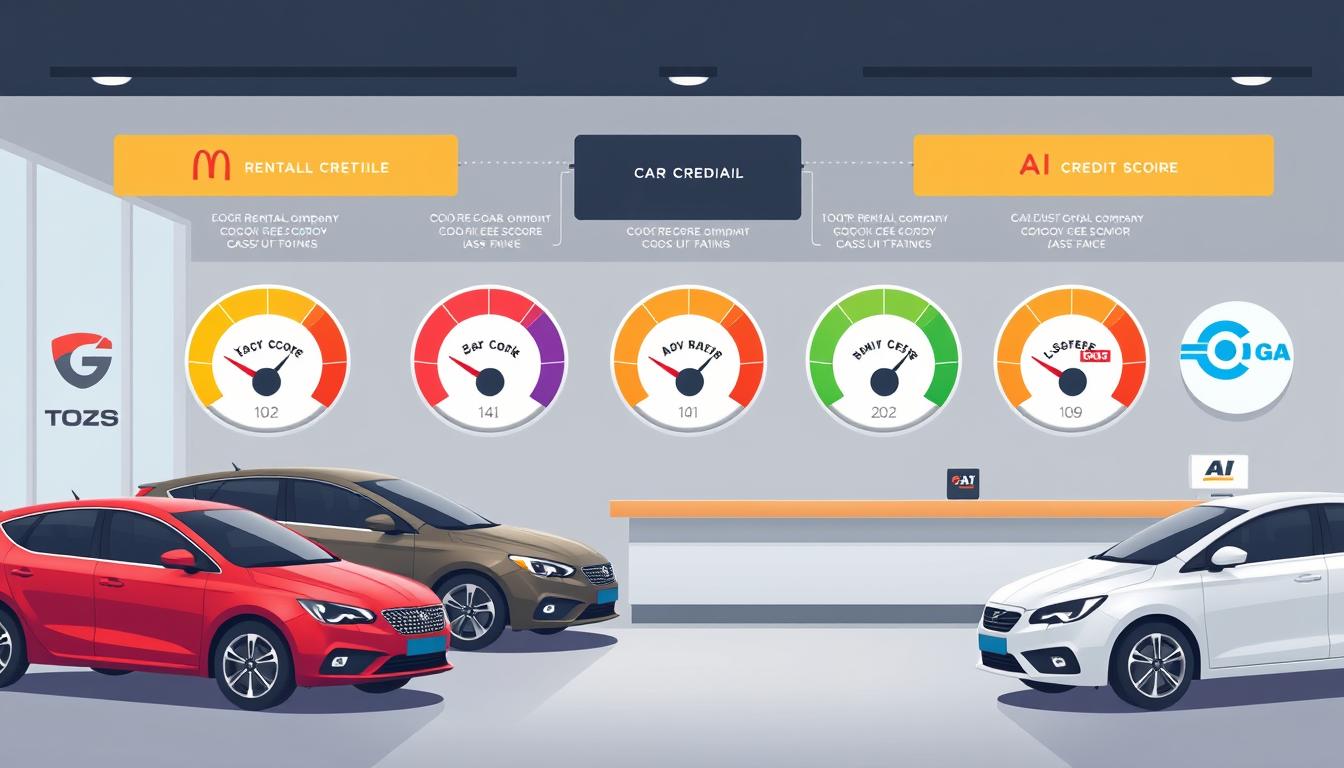Your credit score matters when renting a car. Rental companies check credit histories to assess risk. Understanding credit requirements is key for approval and rental terms.
We’ll explore credit score needs for car rentals. We’ll look at factors affecting these requirements. We’ll also discuss renting with less-than-perfect credit.
Alternative options for those not meeting standard criteria will be covered too.
Key Takeaways
- Rental car companies often require a minimum credit score to approve rental applications.
- The specific credit score requirement varies among major rental companies and can be influenced by factors like location and vehicle type.
- Strategies like providing additional security deposits or using a debit card or cash can help rent a car with a low credit score.
- Improving your credit score through responsible credit management can lead to better rental terms and a wider range of rental options.
- Alternative options, such as car-sharing services or rental agencies that don’t require credit checks, may be available for those with low credit scores.
Understanding Credit Scores and Rental Car Requirements
Credit scores are crucial in the car rental process. Rental companies use credit checks to assess customer risk. They may deny rentals or require extra deposits for low credit scores.
Why Credit Scores Matter for Car Rentals
Rental companies see your credit score as a sign of financial responsibility. A higher score suggests you’ll likely make timely payments and follow the rental agreement. A low score may be seen as a red flag.
Companies use credit checks to make informed decisions about renting to you. They also use them to determine what terms to offer.
The Role of Credit Checks in the Rental Process
Most rental companies perform credit checks during the rental process. This helps them evaluate your creditworthiness and set appropriate rental terms. The importance of credit score for renting a car and credit checks for renting a car are key factors.
Rental companies use these factors to assess how rental companies use credit scores when making decisions. Credit checks help determine deposit amounts and rental approval.
“Your credit score is one of the key factors rental companies consider when determining your eligibility and the terms of your rental agreement.”
Understanding credit scores in rentals helps you prepare better. It can lead to a smoother car rental experience. Take steps to ensure success in your next rental.
Minimum Credit Score Requirements by Major Rental Companies
Your credit score affects your car rental eligibility and terms. Major rental companies have set minimum credit score requirements for customers. These standards determine if you can rent a car and under what conditions.
Here are the typical minimum credit score requirements for top rental car providers:
| Rental Car Company | Minimum Credit Score |
|---|---|
| Hertz | 25th percentile FICO score of 638 |
| Avis | 550 or higher |
| Enterprise | No specific minimum, but a credit check is required |
| National | 550 or higher |
| Budget | 550 or higher |
These requirements may change based on location, vehicle type, and your overall creditworthiness. Some companies offer options for customers with lower credit scores. These may include larger security deposits or accepting debit cards.
Knowing the minimum credit score to rent a car by company helps you prepare. Understanding credit score requirements for major rental car companies ensures a smooth rental experience.

Factors Affecting Credit Score Requirements
Your credit score isn’t the only factor in car rental approval. Location, rental duration, and vehicle type also play a role. These elements can impact the credit score needed for approval.
Location and Rental Duration
Rental company location can affect credit score requirements. Some regions may have stricter policies, demanding higher credit scores. The length of your rental matters too.
Longer rentals often need a higher credit score. This applies especially to rentals lasting a week or more.
Vehicle Type and Value
The car you choose impacts credit score requirements. Luxury vehicles may require a higher score than economy cars. Rental companies see expensive cars as a greater financial risk.
| Factors | Impact on Credit Score Requirements |
|---|---|
| Location | Rental agencies in certain regions or states may have stricter policies, requiring a higher credit score. |
| Rental Duration | Longer rentals, such as a week or more, often necessitate a higher credit score than shorter rentals of a few days. |
| Vehicle Type and Value | Renting a high-end, luxury vehicle may require a higher credit score than renting a more modest, economy-class car. |

Knowing these factors helps you prepare for renting a car. You can plan better, regardless of your credit profile. This knowledge increases your chances of a successful rental experience.
Tips for Renting a Car with a Low Credit Score
Renting a car with a low credit score can be tricky. But don’t worry! There are ways to overcome this hurdle. These tips will help you secure a rental, even with less-than-perfect credit.
Providing Additional Security Deposits
Offer a larger security deposit when renting a car. Many companies will work with low-credit customers who put down more money. This shows your commitment and can reduce the company’s perceived risk.
Using a Debit Card or Cash
Try using a debit card or cash instead of a credit card. Some rental companies accept these payment methods from customers with lower credit scores. This can help you avoid the credit check altogether.
These strategies can boost your chances of renting a car with poor credit. Remember, policies vary between companies. Research and talk openly with rental agents to understand your options.

What Credit Score Do I Need to Rent a Car?
Your credit score affects your car rental eligibility and terms. Most rental companies require a minimum score between 500 and 600. These requirements can vary and change over time.
Hertz and Avis typically need a score of 550 or higher. Enterprise may accept scores as low as 500. However, rental companies may have different criteria.
| Rental Company | Minimum Credit Score Requirement |
|---|---|
| Hertz | 550 |
| Avis | 550 |
| Enterprise | 500 |
Meeting the minimum score doesn’t guarantee approval. Rental companies may check your credit and consider other factors. They look at rental history and financial stability too.
With a lower score, you might still rent a car. You may need a larger security deposit or face other limits. Talk openly with the rental company about your situation.

A good credit score helps with car rentals and other financial goals. Understanding rental requirements can improve your experience. Take steps to boost your credit for smoother rentals.
Credit Score Ranges and Rental Car Eligibility
Your credit score impacts your car rental eligibility and terms. Knowing credit score ranges helps you make informed decisions when renting a car.
Credit scores typically fall into these ranges:
- Excellent credit: 800-850
- Good credit: 700-799
- Fair credit: 600-699
- Poor credit: 500-599
- Very poor credit: 300-499
Excellent or good credit scores increase your chances of renting a car easily. Rental companies see these scores as low-risk. They may offer better terms and a wider vehicle selection.
Fair, poor, or very poor credit scores can make renting a car challenging. Companies might require larger deposits or limit vehicle choices. They may even deny your rental request.
Know your credit score before renting a car. It affects your eligibility and rental costs. With this knowledge, you can prepare better and explore alternatives if needed.
Improving Your Credit Score for Better Rental Terms
A lower credit score doesn’t mean you can’t get better rental terms. You can boost your score with effective strategies. This can help you secure more favorable conditions and increase your chances of approval.
Strategies to Boost Your Credit Score
Here are proven ways to enhance your credit score and improve your rental car prospects:
- Pay All Bills on Time – Payment history greatly affects your credit score. Pay all bills by the due date to show responsible money management.
- Reduce Credit Card Balances – Keep card balances low, ideally below 30% of your total credit. This shows lenders you’re not overextended.
- Dispute Credit Report Errors – Check your credit report carefully. Dispute any mistakes with credit bureaus to improve your score.
- Increase Credit Limits – Ask card issuers for higher credit limits. This can boost your credit utilization ratio and score.
- Become an Authorized User – Join a friend’s or family member’s credit card with good history. This can positively impact your credit score.
These how to improve credit score for renting a car tips can enhance your creditworthiness. Implementing ways to boost credit score to rent a car will help secure better rental terms.
Use these credit score improvement tips for renting to take charge of your financial future. With effort, you’ll see positive changes in your credit score and rental options.
Alternative Options for Car Rentals
Bad credit can make renting a car tough. But don’t worry! Several options exist for those struggling with traditional rental channels. These alternatives offer flexibility and accessibility for securing a rental vehicle.
Using a Co-Signer
One solution is finding a co-signer with good credit. This person can vouch for you, helping overcome credit challenges. However, the co-signer must understand their financial responsibility in this arrangement.
Renting from Specialty Companies
Some rental companies focus on people with bad or limited credit. These providers often have more lenient requirements or different evaluation methods. Researching and comparing options in your local area can help you identify the best fit.
Subscription-Based Rental Services
- Another innovative option is subscription-based car rental services, which provide more flexibility and potential benefits for those with credit challenges.
- These services often require a lower upfront deposit or may not even perform a credit check, making them an attractive alternative to traditional rentals.
- The monthly subscription model can also offer advantages like the ability to swap vehicles or access a wider selection of cars compared to a standard rental.
Bad credit doesn’t mean you can’t rent a car. Various options exist to meet your needs. Research thoroughly and understand the terms before choosing an approach.
| Alternative Options | Advantages | Considerations |
|---|---|---|
| Using a Co-Signer | Leverage the co-signer’s creditworthiness | Co-signer takes on financial responsibility |
| Renting from Specialty Companies | More lenient requirements, alternative evaluation | Research and compare local options |
| Subscription-Based Rental Services | Lower upfront deposit, flexible model, wider selection | Understand terms and conditions |
Explore these options if you have bad credit or limited history. Do your homework and understand all terms. Choose the approach that best fits your unique situation and needs.
Conclusion
Credit scores play a crucial role in car rentals. Major companies set minimum requirements based on various factors. These include location, rental duration, and vehicle type.
We’ve explored strategies for securing a car with different credit scores. You can provide additional security deposits or consider alternative rental options. This knowledge empowers you to navigate car rentals confidently.
Maintain a good credit score and know rental company policies. Explore all options to find the best solution for your needs. Understanding credit’s importance helps you make informed decisions.
With this knowledge, you can enjoy a smooth rental experience. Your credit score doesn’t have to limit your options. Smart planning ensures you get the vehicle you need.

